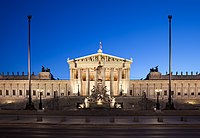National Assembly of Vierzland: Difference between revisions
(Created page with "{{Infobox legislature | name = National Assembly of Vierzland | native_name = ''{{small|Vierzische Verfassunggebende Versammlung}}'' | native_name_lang...") |
No edit summary |
||
| Line 109: | Line 109: | ||
| footnotes = | | footnotes = | ||
}} | }} | ||
The '''National Assembly of Vierzland''', officially the ''''' | The '''National Assembly of Vierzland''', officially the '''''Verfassunggebende Versammlung''''' ([[wikipedia:German language|Vierz]]: {{literal translation|{{wp|Constituent assembly|Constitution-giving assembly}}}}), was a legislative body created under the [[Werner Declaration]] with the purpose of writing and ratifying a new constitution for [[Vierzland]]. It was created in January 1990, elected in February, and dissolved in January 1992 after the signing of the [[Constitution of Vierzland|new constitution]]. | ||
The [[Vierz Revolution]] of the 1980s prompted the legal dissolution of the [[Vierz Empire]] by [[Chancellor of Vierzland|Chancellor]] [[Heinrich Werner]] in 1990. This was accompanied by the termination of the ''[[Reichsthing (Vierzland)|Reichsthing]]'', the imperial legislature, and all other political institutions created under the [[Constitution of the Vierz Empire]]. Thus, the need for a new legislature and constitution was critical. | The [[Vierz Revolution]] of the 1980s prompted the legal dissolution of the [[Vierz Empire]] by [[Chancellor of Vierzland|Chancellor]] [[Heinrich Werner]] in 1990. This was accompanied by the termination of the ''[[Reichsthing (Vierzland)|Reichsthing]]'', the imperial legislature, and all other political institutions created under the [[Constitution of the Vierz Empire]]. Thus, the need for a new legislature and constitution was critical. | ||
[[1990 Vierz national assembly election|Elections were held]] for the assembly on 3 February 1990. While [[wikipedia:Non-partisan democracy|officially non-partisan]], most elected deputies belonged to or were friendly with the [[United Republicans (Vierzland)|United Republicans]]. | [[1990 Vierz national assembly election|Elections were held]] for the assembly on 3 February 1990. While [[wikipedia:Non-partisan democracy|officially non-partisan]], most elected deputies belonged to or were friendly with the [[United Republicans (Vierzland)|United Republicans]]. The resulting constitution generally matched the ideological alignment and demands of the party: {{wp|republicanism}}, {{wp|liberalism}}, and {{wp|secularism}}. | ||
Revision as of 06:35, 6 January 2021
National Assembly of Vierzland Vierzische Verfassunggebende Versammlung | |
|---|---|
Coat of arms of the assembly | |
| Type | |
| Type | |
| History | |
| Founded | 10 January 1990 |
| Disbanded | 4 January 1992 |
| Preceded by | Reichsthing |
| Succeeded by | Federal Assembly |
| Leadership | |
President of the Assembly | |
Deputy President of the Assembly | Joachim Holtz |
Chairman of the Drafting Committee | |
| Structure | |
| Seats | 372 |
Length of term | Undetermined |
| Elections | |
| First-past-the-post | |
First election | 3 February 1990 |
| Meeting place | |
 | |
| Ehrepalast Adtrus, Vierzland | |
The National Assembly of Vierzland, officially the Verfassunggebende Versammlung (Vierz: lit. Constitution-giving assembly), was a legislative body created under the Werner Declaration with the purpose of writing and ratifying a new constitution for Vierzland. It was created in January 1990, elected in February, and dissolved in January 1992 after the signing of the new constitution.
The Vierz Revolution of the 1980s prompted the legal dissolution of the Vierz Empire by Chancellor Heinrich Werner in 1990. This was accompanied by the termination of the Reichsthing, the imperial legislature, and all other political institutions created under the Constitution of the Vierz Empire. Thus, the need for a new legislature and constitution was critical.
Elections were held for the assembly on 3 February 1990. While officially non-partisan, most elected deputies belonged to or were friendly with the United Republicans. The resulting constitution generally matched the ideological alignment and demands of the party: republicanism, liberalism, and secularism.